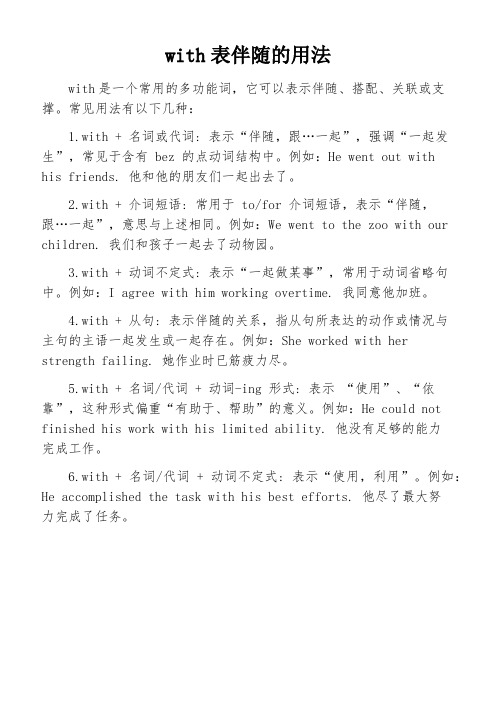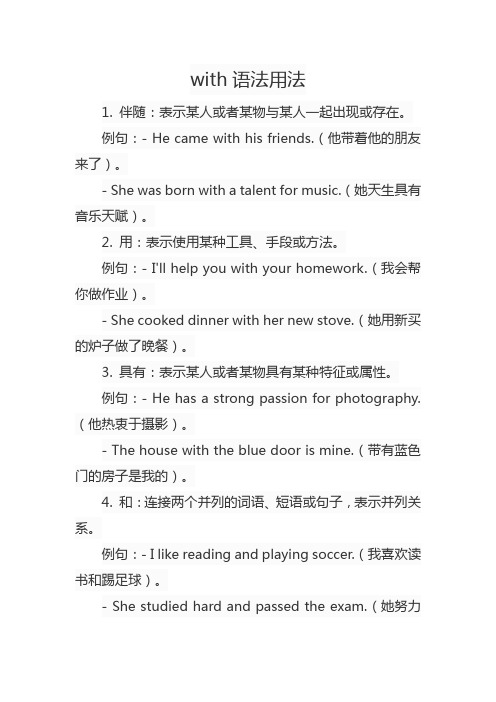with用法
with表伴随的用法

with表伴随的用法
with是一个常用的多功能词,它可以表示伴随、搭配、关联或支撑。
常见用法有以下几种:
1.with + 名词或代词: 表示“伴随,跟…一起”,强调“一起发生”,常见于含有 bez 的点动词结构中。
例如:He went out with
his friends. 他和他的朋友们一起出去了。
2.with + 介词短语: 常用于 to/for 介词短语,表示“伴随,跟…一起”,意思与上述相同。
例如:We went to the zoo with our children. 我们和孩子一起去了动物园。
3.with + 动词不定式: 表示“一起做某事”,常用于动词省略句中。
例如:I agree with him working overtime. 我同意他加班。
4.with + 从句: 表示伴随的关系,指从句所表达的动作或情况与
主句的主语一起发生或一起存在。
例如:She worked with her strength failing. 她作业时已筋疲力尽。
5.with + 名词/代词 + 动词-ing 形式: 表示“使用”、“依靠”,这种形式偏重“有助于、帮助”的意义。
例如:He could not finished his work with his limited ability. 他没有足够的能力
完成工作。
6.with + 名词/代词 + 动词不定式: 表示“使用,利用”。
例如:He accomplished the task with his best efforts. 他尽了最大努
力完成了任务。
with的用法和例句

with的用法和例句with有用;随着;包括;和 ... 一起等意思,那么你知道with的用法吗?下面跟着店铺一起来学习一下,希望对大家的学习有所帮助!with的用法大全:with的用法1:with表示状态时,还可作“跟上…”“听懂…的话”解,一般用于疑问句或否定句中。
with的用法2:with表示关系时还可作“与…合并〔混合,组合〕”解。
with的用法3:with表示伴随状态时,作“以与…同样的方向〔程度,比率〕”解。
可接“名词+动词不定式”“名词+现在分词”“名词+过去分词”。
with的用法4:with表示比较时作“同…相比”“与…平行”解。
with的用法5:with可以用来表示虚拟语气,意思是“如果,假如”。
用于诗歌或民谣的副歌、叠句中, with常无实际含意。
with的用法例句:1. Beauty is an attitude. It has nothing to do with age.美是一种态度,与年龄无关。
2. If you're not satisfied with the life you're living, don't just complain. Do something about it.对于现况的不满,不能只是抱怨,要有勇气作出改变。
3. He was well acquainted with the literature of France, Germany and Holland.他对于法国、德国和荷兰的文学了如指掌。
4. I thought I'd enrol you with an art group at the school.我想我会吸收你参加学校的一个艺术团。
5. Somehow Karin managed to cope with the demands of her career.卡琳设法达到了其职业的要求。
6. She ran away with a man called McTavish last year.去年,她和一个叫麦克塔维什的男人私奔了。
with用法大全

with用法大全with是一个常用的英语介词,它有多种用法,下面是with用法的大全:1. 表示伴随,即“和……一起”、“带着”、“随着”等意思,例如:- I went to the park with my friends.(我和我的朋友们一起去了公园。
)- She left the party with a smile on her face.(她带着微笑离开了派对。
)- With age comes wisdom.(随着年龄的增长,智慧也随之而来。
)2. 表示使用,即“用……”、“以……方式”等意思,例如:- I wrote the letter with a pen.(我用钢笔写了这封信。
)- He spoke with a heavy accent.(他带着浓重的口音说话。
)3. 表示原因,即“由于”、“因为”等意思,例如:- With all due respect, I disagree with your opinion.(恕我直言,我不同意你的观点。
)- With the weather being so bad, we decided to stay indoors.(由于天气太糟糕,我们决定呆在室内。
)4. 表示附带条件,即“带有”、“附带”等意思,例如:- The car comes with a full tank of gas.(这辆车带有满满一箱油。
)- The package comes with a free gift.(这个包裹附带一份免费礼品。
)5. 表示比较,即“和……一样”、“跟……比较”等意思,例如:- She is tall with her sister.(跟她姐姐一样,她也很高。
)- The new model is faster with better fuel efficiency. (新款车型比旧款车型更快,油耗更低。
)6. 表示时间,即“在……期间”、“在……时候”等意思,例如:- With each passing day, I miss you more.(随着每一天的过去,我越来越想念你。
with的六种用法例句

with的六种用法例句"with"在英语中有多种用法,下面是六种常见的用法,并附上例句:1. 表达伴随关系:- I went to the party with my friends.(我和我的朋友一起去了派对。
)- She enjoys hiking with her dog.(她喜欢带着她的狗一起徒步旅行。
)2. 表达具备某种特征或属性:- He is a teacher with a lot of experience.(他是一位经验丰富的教师。
)- She is a singer with a beautiful voice.(她是一位声音优美的歌手。
)3. 表达用某种方式或工具:- Cut the vegetables with a sharp knife.(用一把锋利的刀切蔬菜。
) - She painted the picture with watercolors.(她用水彩画了这幅画。
)4. 表达具有某种情感或状态:- He greeted me with a warm smile.(他带着热情的微笑向我打招呼。
) - She looked at him with suspicion.(她带着怀疑的目光看着他。
)5. 表达在某个时间或地点:- I will meet you with the park entrance.(我在公园门口和你见面。
) - Let's have lunch with the cafeteria.(我们在食堂吃午餐吧。
)6. 表达按照某种标准或规则:- He won the race with a new record.(他以新的纪录赢得了比赛。
) - She solved the math problem with the correct formula.(她用正确的公式解了这个数学问题。
)这些例句展示了"with"在不同语境下的用法,希望可以帮助你更好地理解和运用这个词。
with语法用法

with语法用法1. 伴随:表示某人或者某物与某人一起出现或存在。
例句:- He came with his friends.(他带着他的朋友来了)。
- She was born with a talent for music.(她天生具有音乐天赋)。
2. 用:表示使用某种工具、手段或方法。
例句:- I'll help you with your homework.(我会帮你做作业)。
- She cooked dinner with her new stove.(她用新买的炉子做了晚餐)。
3. 具有:表示某人或者某物具有某种特征或属性。
例句:- He has a strong passion for photography.(他热衷于摄影)。
- The house with the blue door is mine.(带有蓝色门的房子是我的)。
4. 和:连接两个并列的词语、短语或句子,表示并列关系。
例句:- I like reading and playing soccer.(我喜欢读书和踢足球)。
- She studied hard and passed the exam.(她努力学习并通过了考试)。
5. 随着:表示随着时间、顺序或某个过程的发展。
例句:- The sun sets with the evening.(随着傍晚,太阳下山了)。
- He grew older with the years.(随着年龄的增长,他变老了)。
6. 关于:表示与某人、某事或某种情况有关。
例句:- We had a discussion about the project.(我们讨论了关于这个项目的事情)。
- She is very knowledgeable about history.(她对历史很了解)。
7. 跟:表示跟随某人或者某物。
例句:- He followed her with his eyes.(他目送她离开)。
with的用法总结(通用8篇)

with的用法总结with的用法总结(通用8篇)总结是把一定阶段内的有关情况分析研究,做出有指导性的经验方法以及结论的书面材料,它能帮我们理顺知识结构,突出重点,突破难点,因此好好准备一份总结吧。
那么总结要注意有什么内容呢?以下是小编收集整理的with的用法总结,欢迎阅读与收藏。
with的用法总结篇1一、with或without+名词/代词+形容词例句:1.I like to sleep with the windows open.我喜欢把窗户开着睡觉。
(伴随情况)2.With the weather so close and stuffy, ten to one itll rain presently.大气这样闷,十之_要下雨(原因状语)二、with或without+名词/代词+副词例句:1.She left the room with all the lights on.她离开了房间,灯还亮着。
(伴随情况)2.The boy stood there with his head down.这个男孩低头站在那儿。
(伴随情况)三、with或without+名词/代词+介词短语例句:1.He walked into the dark street with a stick in his hand.他走进黑暗的街道时手里拿着根棍子。
(伴随情况)2.With the children at school, we cant take our vacation when we want to.由于孩子们在上学,所以当我们想度假时而不能去度假。
(原因状语)四、with或without+名词/代词+非谓语动词1、with或without+名词/代词+动词不定式,此时,不定式表示将发生的动作。
例句:1.With no one to talk to, John felt miserable.由于没人可以说话的人,约翰感到很悲哀。
with的用法及短语搭配
with的用法及短语搭配一、引言英语中,介词with是使用频率最高的介词之一,其用法广泛且多样。
在不同的语境中,with可以表示附带条件、伴随关系、方式手段等意义。
本文将详细介绍with的常见用法及相关短语搭配。
二、表达附带条件1. with + 名词:常用于描述某种情况下的特定条件或限制。
例如:- With experience comes wisdom.(经验而来才有智慧)- You can eat dessert, but only with your parents' permission.(你可以吃甜点,但需要得到父母的允许)2. with + 动名词:表示某动作或状态是另一个动作或状态的前提或结果。
例如:- She fell asleep with the TV on.(她睡觉时电视还开着)- He broke the record with his incredible speed.(他以惊人的速度打破了记录)三、表示伴随关系1. 表示身体部位:with + body part:指明具体部位和相关行为或感觉。
例如:- She covered her face with her hands and started crying.(她捂住脸开始哭)- He looked at me with a smile on his face.(他面带微笑地看着我)2. 表示人或物伴随状态:with + 人/物:表示某人或某物与另一人或物的伴随关系。
例如:- The child went to the park with his mother.(小孩和他妈妈一起去了公园)- She bought a new car with her savings.(她用存款买了辆新车)四、表示方式手段1. with + 名词:表示使用某种工具或手段进行行动。
例如:- He repaired the bike with a set of tools.(他用一套工具修好了自行车)- They won the game with teamwork and determination.(他们靠团队合作和决心赢得了比赛)2. with + 动词原形:表示使用特定方法或策略来实现目标。
with在句中的用法
with在句中的用法
1.表示方式,意为“以……的方式,用……工具”。
2.表示原因,相当于because或由于。
3.表示伴随,意为“与……同时发生”。
4.表示对象,方法,接受者以外的具体对象。
5.引出倒装结构,当句子中有过去分词和不定式时,常用with连接。
6.with+宾语+现在分词/过去分词/形容词/副词/不定式/介词短语等,在句中作状语,表示伴随情况。
7.with+宾语+副词原级,表示最高级。
8.with+宾语+过去分词,可表示被动或完成了的动作。
9.with+宾语+不定式(to do),表示将来的动作。
10.with+宾语+现在分词(doing),表示正在进行的动作。
11.with+宾语+形容词/副词比较级+than…,表示比较。
12.with+宾语+without=with out,表示“有”与“没有”之意。
13.with+宾语+复合结构,表示复合结构中的名词或代词为句子主语时,该复合结构后的介词不能省略。
14.with+宾语+名词(该名词为句中表语)+形容词,形容词指人的名词前通常加冠词a an the a。
with短语用法
with短语用法
"with"是一个常用的介词,在英语中有很多短语用法,下面列举一些常见的用法:
1. with + 名词+ 形容词:表示“具有……特征的”,如:
a book with a red cover(有红色封面的书)。
2. with + 名词+ 介词短语:表示“用……”,如:write with a pen(用笔写字)。
3. with + 名词+ 副词:表示“用……方法”,如:cook with oil(用油烹饪)。
4. with + 名词+ 名词:表示“和……一起”,如:go out with friends(和朋友一起出去)。
5. with + 名词+ 动词过去分词:表示“拥有……的”,如:
a house with a garden(有花园的房子)。
6. with + 名词+ 介词短语+ 动词不定式:表示“用……做……”,如:write with a pen to make a list(用笔写下清单)。
7. with + 名词+ 介词短语+ 动名词:表示“用……做……”,如:play with a ball(用球玩)。
8. with + 名词+ 副词+ 动词不定式:表示“用……方式做……”,如:speak with confidence(用自信的方式说话)。
“with”短语在英语中有很多用法,需要根据具体的语
境和句子结构来理解。
with的五种用法
“WITH”作为英语中一个常见且多功能的介词,有以下五种主要用法:
1. 表示伴随:用来表达与某人或某物在同一个地点或一起参与某事。
例如:“WHERE IS JAMIE? HE IS WITH HI S MOTHER.” 这里的“WITH”表示杰米和他妈妈在一起。
2. 表示方式或手段:“WITH”可以用来描述做事的方式或使用的工具。
例如:“I OPENED
A CAN OF CAT FOOD WITH A CAN OPENER.” 这里“WITH”指的是使用开罐器来开罐头。
3. 表示状态:可以与名词(代词)结合,后接现在分词、过去分词、形容词等构成复合结构,用来描述主语的状态。
例如:“HE STOOD THERE, WITH HIS HAND RAISED.” 这里“WITH”后面的结构说明他举手站着。
4. 表示原因或结果:有时也用来表示因为某种原因而出现的结果或状况。
这通常需要根据上下文来判断。
5. 表示对比或比较:用于比较两个事物时,表明它们之间的相似性或差异性。
例如:“SHE DID IT WITH MOR E CARE THAN I EXPECT ED.” 这里“WITH”用于比较她做事情的仔细程度和我的预期之间的对比。
- 1、下载文档前请自行甄别文档内容的完整性,平台不提供额外的编辑、内容补充、找答案等附加服务。
- 2、"仅部分预览"的文档,不可在线预览部分如存在完整性等问题,可反馈申请退款(可完整预览的文档不适用该条件!)。
- 3、如文档侵犯您的权益,请联系客服反馈,我们会尽快为您处理(人工客服工作时间:9:00-18:30)。
介詞with用法詳解是一個十分有用的介詞,其用法也比較複雜,以下用法值得注意:1. 表示方式、手段或工具等時(=以,用),注意不要受漢語意思的影響而用錯搭配,如「用英語」習慣上用in English,而不是with English。
2. 與某些抽像名詞連用時,其作用相當於一個副詞。
如:with care=carefully 認真地with kindness=kindly 親切地with joy=joyfully 高興地with anger=angrily 生氣地with sorrow=sorrowfully 悲傷地with ease=easily 容易地with delight=delightedly 高興地with great fluency =very fluently 很流利地3. 表示條件時,根據情況可與虛擬語氣連用。
如:With more money I would be able to buy it. 要是錢多一點,我就買得起了。
With better equipment, we could have finished the job even sooner. 要是設備好些,我們完成這項工作還要快些。
4. 比較with和as:兩者均可表示「隨著」,但前者是介詞,後接名詞或代詞;後者是連詞,用於引導一個句子。
比較:He will improve as he grows older. 隨著年齡的增長,他會進步的。
People’s ideas change with the change of the times. 時代變了,人們的觀念也會變化。
5. 復合結構「with+賓語+賓語補足語」是一個很有用的結構,它在句中主要用作狀語,表示伴隨、原因、時間、條件、方式等;其中的賓語補足語可以是名詞、形容詞、副詞、現在分詞、過去分詞、不定式、介詞短語等。
如:(1) with+賓語+形容詞He often sleeps with the windows open. 他常開著窗睡覺。
Don’t speak with your mouth full. 不要滿嘴巴食物說話。
(2) with+賓語+ 副詞He stood before his teacher with his head down. 他低著頭站在老師面前。
He was lying on the bed with all his clothes on. 他和衣躺在床上。
(3) with +賓語+ 介詞短語She said good-bye with tears in her eyes. 她含著眼淚說了聲再見。
The man was asleep with his head on his arms. 這個人頭枕著胳膊睡著了。
(4) with+賓語+現在分詞He fell asleep with the lamp burning. 他沒熄燈就睡著了。
I won’t be able to go on holiday with my mother being ill. 因為媽媽有病, 我無法去度假。
(5) with +賓語+ 過去分詞He sat there with his eyes closed. 他閉目坐在那兒。
All the afternoon he worked with the door locked. 整個下午他都鎖著門在房裡工作。
(6) with +賓語+ 動詞不定式I can’t go out with al l these clothes to wash. 要洗這些衣服, 我無法出去了。
With such good cadres to carry out the Party’s policy we feel safe. 有這樣的好幹部執行黨的政策, 我們感到放心。
(7) with +賓語+ 名詞He died with his daughter yet a schoolgirl. 他去世時,女兒還是個小學生。
Without介詞用法1.缺乏;沒有;無:Without good health happiness is impossible. 沒有良好的健康,不可能有幸福。
/He always goes out without a hat on no matter how cold it is.無論天氣多麼冷,他出門總是不戴帽子。
/Mother cannot live without her child and her child cannot live without her.媽媽沒有她的孩子就不能活,她的孩子沒有她也不能活。
/ He always does up to his parents』biddings without any hesitation.他父母囑咐他的話他總是毫不猶豫地做到。
2.(舊用法)在……的外面:Negotiations are carried out within and without the House.磋商在議院內外進行。
/ The king showed so much courtesy to his honoured guests that he met them without the gate of his palace.國王對他的貴賓如此禮遇,他在宮殿大門外迎接他們。
◆本詞也是副詞(舊用法),詞義為:在外面We all detest things fair without and foul within.我們都憎惡外觀美麗內中醜惡的事物。
/Children all play indoors because it is cold without.孩子們都在屋裡玩,因為戶外很冷。
A prophet is not without honour,save in his own country. 〈諺語〉先知者在故鄉無人尊重;外來的和尚會唸經。
A saying goes: a prophet is not without honour,save in his own country,so our factories and enterprises all employ foreign experts with high rewards,though they are not the least better than our own.諺語云:外來的和尚會唸經,所以我們的工廠企業都以重金聘請外國專家,雖然他們一點也不比我們自己的專家高明。
be the better without 如果沒有(某事物)就更好:Our circumstances will be the better without those chemical works which contaminate the air. 如果沒有那些污染大氣的化工廠,我們的環境會更好些。
be without a bean 身無分文:These poor people are still very happy though they are without a bean.雖然那些窮人身無分文,但是他們仍然非常快樂。
be without bias 不偏不倚;公正:A judge should be without bias so that he can do justice in lawsuits.法官應當不偏不倚,以便公正對待訟案。
be without side 不擺架子;不自負:My tutor has attained eminent academic achievements,but he is still humble and prudent,amiable and easy of approach without side.我的導師已經獲得卓越的學術成就,但他仍然謙虛謹慎,平易近人,不擺架子。
without的詞性:adv.(副詞)1. On the outside:在外部:用法與例句:a sturdy structure within and without.內外都很堅固的結構2. With something absent or lacking:缺少:在沒有或缺少…的情況下:用法與例句:had to do without.沒有只好作罷without的詞性:prep.Abbr. w/o(介詞)縮寫w/o3. Not having; lacking:沒有;缺少:用法與例句:a family without a car.沒有汽車的家庭4. Not accompanied by; in the absence of:沒有陪伴;沒有…:用法與例句:volunteered without hesitation; spoke without thinking.毫不猶豫地自告奮勇;脫口而出5. At, on, to, or toward the outside or exterior of:在外面;對著外面;向著外部:用法與例句:standing without the door.站在門外without的詞性:conj.Regional (連接詞)【區域的】6. Unless:除非,如果不:用法與例句:「You don't know about me without you have read a book by the name of The Adventures of Tom Sawyer 」(Mark Twain)「如果你沒有讀過一本叫湯姆·索亞歷險記的書的話,你就不知道我」(馬克·吐溫)。
